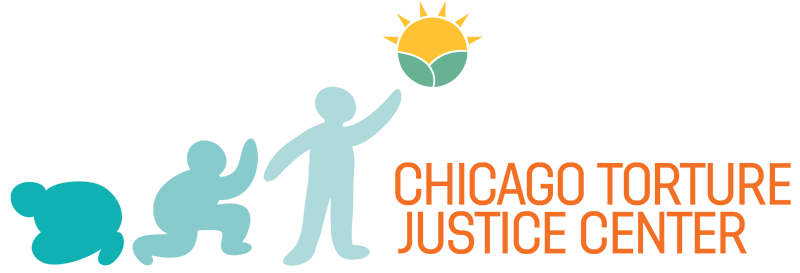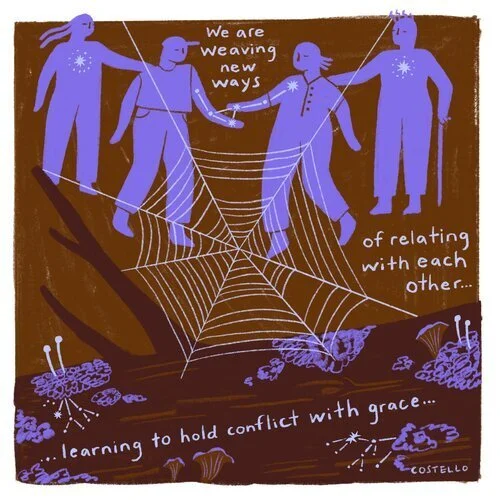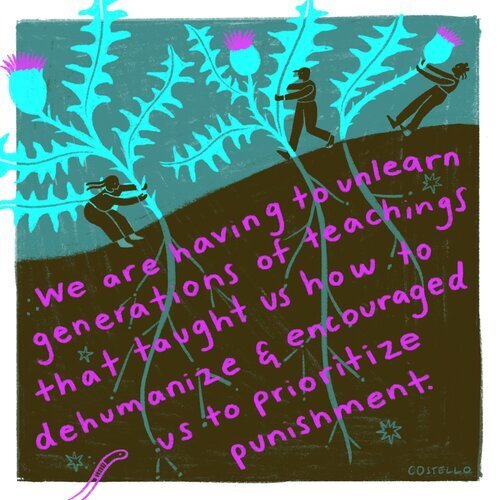Standing Unapologetically With All Survivors
Survivors of police torture and violence are at the heart of everything we do at the Chicago Torture Justice Center, and we are unapologetic and uncompromising in our support for all survivors. Healing from trauma–especially trauma that is facilitated and reinforced by the state over decades–is difficult and complex to navigate. All the survivors in our community are at different stages of their journeys, and at the Center it’s our mission to make sure that survivors know that they don’t have to walk alone.
Artwork by Molly Costello. Image text: We are weaving new ways of relating with each other… learning to hold conflict with grace.
We are intentional about operating through a lens of transformation and Politicized Healing at every step of the way. This means that we sit with survivors through times of difficulty, through navigating their past traumas, and collectively work through what it means to be accountable when harm occurs within our communities. We do not expect to have the answers. Solutions come from the connections and conversations we have with one another, and it takes time, trust, and deep commitment to our values to move towards them. Our values are rooted in the transformation and hope of a world free from police and state violence, a world in which we have the capacity to grow and learn from mistakes, and where accountability doesn’t mean punishment. We are committed to living this value as a community.
We all carry varying amounts of trauma. Survivors especially, often carry a substantial amount of trauma - which starts with societal and community violence resulting from centuries of racist oppression, to violent encounters with the police, to being subjected for decades to harsh prison conditions, to then reentering back into a society that continues to reject them. This trauma impacts a survivor’s daily life, their relationships, their outlook and their approach to healing. It manifests in ways that can cause hurt and misunderstanding.
“The work of repair, of reparations, requires us to transform the ways we’ve internalized these systems in ourselves and in our practices.”
Showing up for each other while navigating this complexity is challenging, but it’s why we’re here. We are here to challenge the systems that punish and incarcerate, and we do this by creating our own ways of addressing harm in our community by actively choosing not to replicate the punitive mentality of disposing people from our movement and our spaces. We move at the speed of trust, by taking our time and setting boundaries along the way that feel rooted in our values and love for each other.
Doing this work of reparations and transformation means being committed to undertaking the intricacies of trauma that follow in the wake of state violence. This work requires us to hold and understand the multitudes we all, and especially survivors, embody. This work also helps us understand that policing and punitive behavior is so deeply embedded in the foundation of our institutions, that it can manifest in a number of ways within our movement: performative allyship, opportunism, exploiting survivors’s stories, elitism, excluding survivors, etc.
Artwork by Molly Costello. Image text: We are having to unlearn generations of teachings that taught us how to dehumanize & encouraged us to prioritize punishment.
The work of repair, of reparations, requires us to transform the ways we’ve internalized these systems in ourselves and in our practices. As Prentis Hemphill beautifully writes in their powerful piece Letting Go of Innocence: “What changes us are the processes of making amends, incorporating another’s reality into our own, of knowing ourselves, our motivations, of being in practice that interrupts our unconscious and violent flailing. What changes us is vulnerability, acknowledgement, and responsibility.”
We have to name and acknowledge harm where it occurs, and move forward not with ease, but with intention and care for each other and ourselves. There is no expectation of perfection in our work, in fact, we reject the notion of perfectionism by embracing our complexities. It’s the way we maneuver through our inevitable mistakes and shortcomings that brings us closer to our values of liberation and radical transformation.



